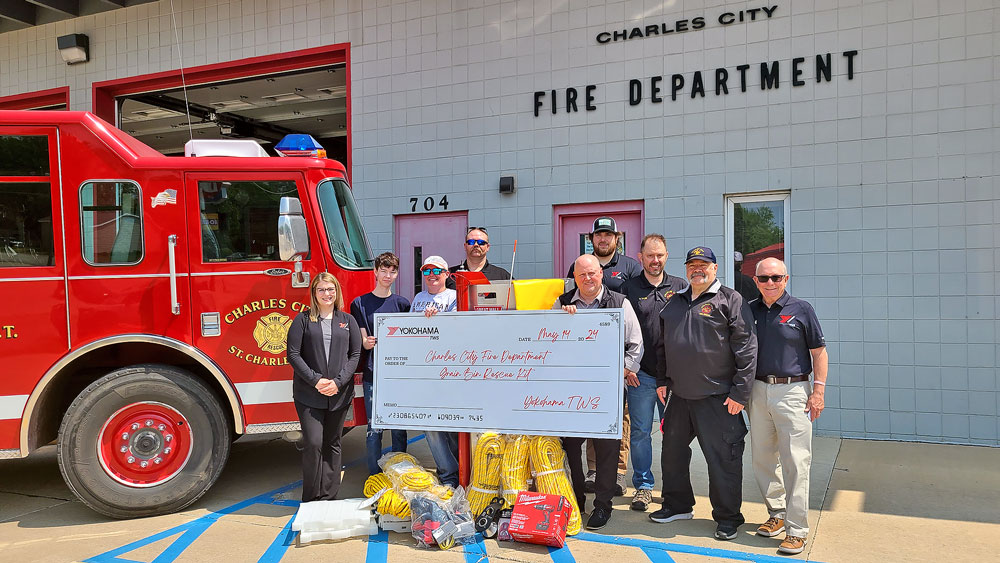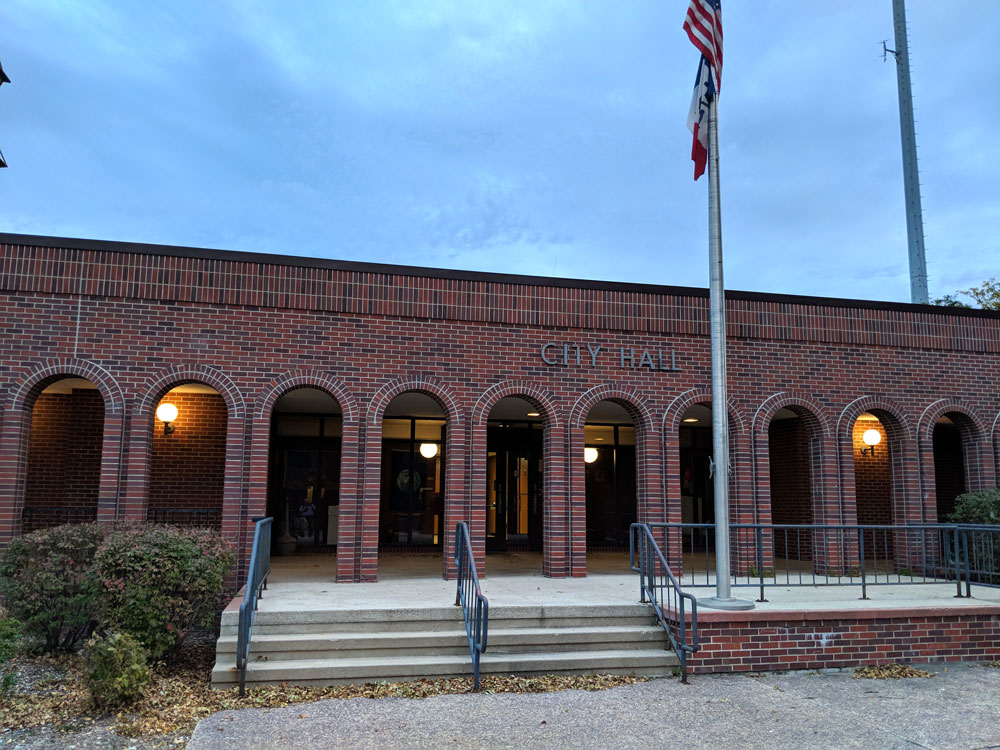Floyd County supervisors are urged to make pipeline inspector decision
By Bob Steenson, bsteenson@charlescitypress.com
If any or all of the carbon dioxide pipelines being proposed to go through Iowa are approved, state code requires that engineers monitor the construction phase to make sure that agricultural ground is returned to an agreed-upon condition.
In the case of Floyd County, which is proposed to include both the Navigator and Summit Carbon Solutions CO2 pipelines, several engineering companies have made their pitches to the county Board of Supervisors, asking to be chosen for the inspection job.
All of the costs of the monitoring and inspection are supposed to be paid by the pipeline companies.
The companies have all made their case why they should be chosen, but so far the supervisors have not made a decision, because actual construction – if approved – is likely many months out, and because a majority of the board will be new after the first of the year.
Of the three board members, Supervisors Linda Tjaden and Roy Schwickerath are not seeking re-election. Supervisor Doug Kamm is running for re-election, but he faces two opponents in the race to represent the new Supervisor District 1.
At the board meeting this week, a representative of ISG Inc. of Des Moines tried to make the case that the sooner the board makes a decision on which company to hire, the better it will be for the landowners whose property the pipeline will run through.
“So when do you need to do this?” asked Evan Del Val, an engineer and employee owner with ISG. “I would say as soon as possible.”
Summit has already submitted an application for a permit to build the pipeline with the Iowa Utilities Board, and has requested the right to use eminent domain to force easements on any property where the owners don’t agree to easements voluntarily.
“I can promise you that the pipeline is spending every day between now and when that gets approved gearing up with their contractor, gearing up with their materials, gearing up with their plan. And once that permit gets issued, they’re going to go,” Del Val said.
He said the inspection decision “is the single most important decision that Floyd County can make on this project.”
For example, he said, for the Navigator project there are 84 pipeline corridor parcels that the pipeline will pass through.
“So that’s potentially 84 different landowners that make their living off of this property. And my belief is the county inspection is the only thing that the state of Iowa, landowners and residents have at their disposal to make sure that the companies don’t run over them.”
Supervisor Linda Tjaden said she didn’t see any reason to wait on selecting an engineering firm.
“I think we’ve had three companies come here and, now, what, we’ve got to wait for another (supervisor) board to bring them back in?” she asked. “I just believe it is our role and responsibility. We are still here until January, and I am under the belief, myself, that I don’t see any reason for us not to be able to make a decision, because I am concerned about that, that once things start moving that we have someone that’s really supporting and ready to go.”
Schwickerath said he had no problem making a decision even with a new board coming in at the beginning of the new year, if he thought there was a need to make a decision now.
“I’m just trying to figure out what the time frame is that that it should be done,” he said.
Del Val said legally the supervisors never have to hire an engineering firm to do the inspections, because the county has a licensed county engineer. But few if any county engineering departments have the expertise or the personnel to handle the job, he said.
ISG acted as the inspector for more than half of the 354-mile Dakota Access oil pipeline that was built through the state several years ago, he said, and the pipeline projects are several times that length.
“At the height of Dakota Access we were working about 11 hours a day, seven days a week for 3½ months. That’s why your county engineer doesn’t necessarily have the capacity to do that,” Del Val said.
Very few engineering firms have the internal capacity for that, either, he said. ISG hires pipeline inspectors from all over the country to work on a job like this.
“The way we do it is we hire experienced pipeline inspectors. That means we’re bringing people in from Florida, Ohio, Pennsylvania, Colorado, New Mexico, California – all over, people who understand the scope of these projects,” he said. “The reason we do that is because that’s the way the pipeline industry works. People will travel from all over the country to these projects.”
He said that as of this week ISG had been hired by 13 counties for Summit, 14 counties for Navigator, and by two counties for another pipeline project that doesn’t impact Floyd County, the Wolf Carbon Solutions-ADM project.
Del Val said that because of his company’s experience on the Dakota Access pipeline, the Iowa Utilities Board hired it to help write revised rules for future pipeline projects.
A lot of those rules are improved now, and will do a better job of making sure that topsoil and subsoils are returned to an original condition, for example, he said. But there are still a lot of areas where the rules are vague, such as soil compaction limits.
He said ISG and the Iowa State Association of Counties (ISAC) is working with Iowa State University on a soil compaction study that they hope to get on the Iowa Utilities Board docket to be able to be used in setting up the land restoration standards agreements.
Coincidentally, another item on the supervisor’s agenda was to consider a proposal from ISAC to help support the study, and the board agreed to contribute the requested $600.
Del Val said it was very important that the county pick the right engineering company for the inspections.
“You put in a roadway and it’s wrong, you can fix that roadway. You put in a sewer line or a drain tile or you put in camper pads, and they’re wrong, you can fix them. It’s at a cost to you and it’s at a time constraint to you, but you can fix those things. You mess this up and your landowners will not recoup it for decades, likely generations,” he said.
The item was not on the agenda to make a decision regarding hiring a pipeline project inspector at the meeting this week.
Also at the meeting, in addition to approving supporting the ISAC and ISU soil compaction study, the board:
• Approved two Conservation Department projects using American Rescue Plan Act (ARPA) funds, spending a little more than $2,000 for kitchen and bathroom updates for the Darling Cabin at the Tosanak Recreation Area, and $19,716 for new handicapped-accessible main doors and a new amphitheater door at the Fossil and Prairie Park Center, but holding off on a request for almost $118,000 to build 18 new RV camp pads with water, electricity and sewage disposal at Tosanak until decisions are made on other ARPA funding requests.
• Received the annual weed commissioner’s report from Adam Sears, the conservation director and weed commissioner. Sears also suggested that the county Secondary Roads Department take on the responsibility of weed commission, because many of the weed complaints concern county road rights of way, but the board made no decision.
• Set a public hearing for 3 p.m. Monday, Dec. 5, regarding an engineer’s report on Drainage District No. 3. Estimated construction and repair costs are $590,000, with an additional $207,500 for damages, engineering, annexation and reclassification, for a total of $797,500 that would be assessed against property owners in the 8,546-acre district.









Social Share